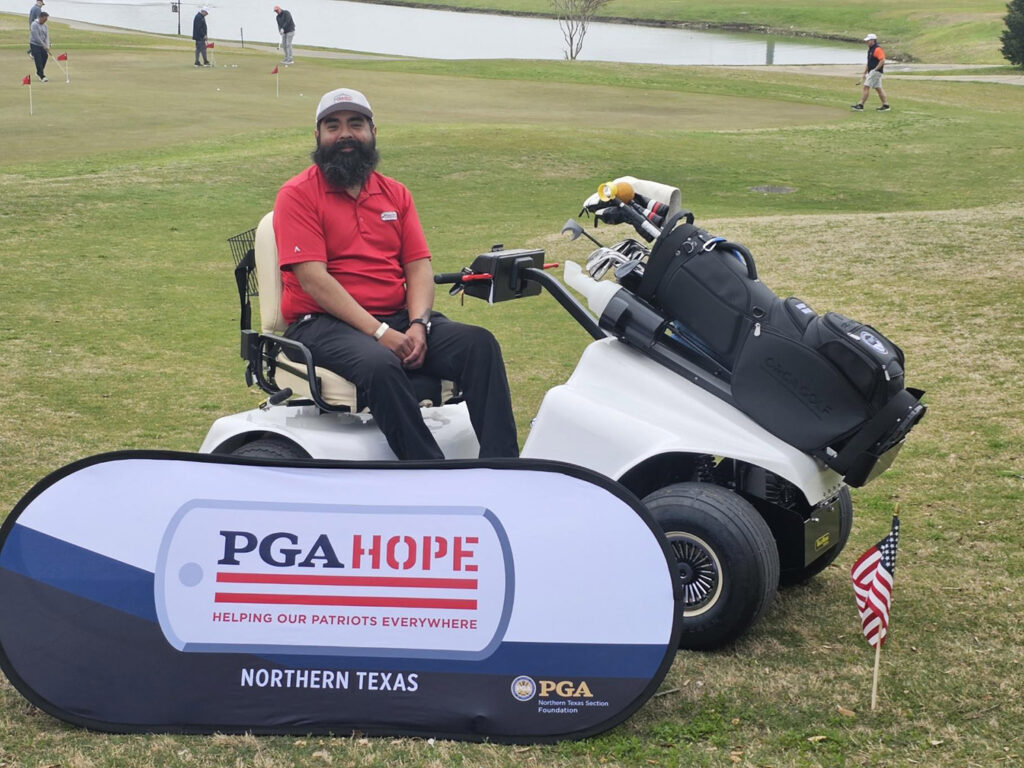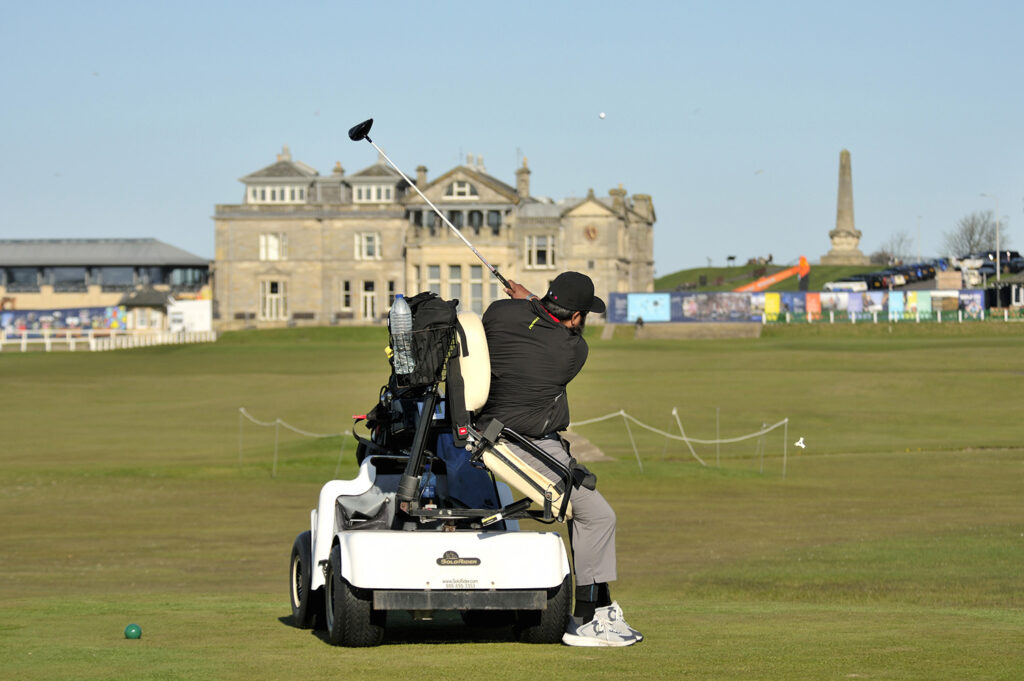Story by Lawson Martin. Video by Jennie Trejo. Photos provided by PGA HOPE.
Randy Shack grew up in West Phoenix, Arizona, where many of his family members and friends were in the military. Randy, who now lives between Sulphur Springs and Paris, Texas, followed in his loved ones’ footsteps by joining the military in 2006.
During Randy’s tour in Iraq in 2007, he was medically discharged due to injuries he received from an explosion. Randy returned to the United States two days before Christmas, where he transitioned to Sheppard Air Force Base in Wichita County, Texas.
“They didn’t have any programs for veterans returning from Iraq there or for military personnel,” Randy says. “So we started one called Desert to Desk.”
Randy says this program helped many other people in the military talk about their experiences and transition back into civilian life.
A year after Randy was discharged from the military, his back completely gave out, and he became paralyzed. He was admitted into the spinal cord injury unit in the U.S. Department of Veterans Affairs. While at the V.A., staff members asked him about his hobbies before the military.
“Growing up in Phoenix, there are golf courses all around the area, so we’d always have golf clubs in our bags and hit the driving range or play a few courses,” Randy says. “So I mentioned golf.”

Soon after, Randy received an email informing him of the PGA HOPE program, a flagship program of PGA REACH, the charitable foundation of the PGA of America. HOPE stands for “helping our patriots everywhere.” PGA HOPE is a rehabilitative golf program for veterans and active-duty military that was created to enhance their physical, mental, social, and emotional well-being.
Led by PGA professionals trained in adaptive golf and military cultural competency, the program presents golf through a structured six- to eight-week curriculum for development.
Randy says his wife pushed him to participate in the Cedar Crest Golf Course program because she knew he liked golf. Randy joined the PGA HOPE program in 2016 and has been a part of it ever since.
According to the V.A., physical activity is “important to maintaining good health, speeding recovery, and improving the overall quality of life.” Injured veterans often experience their initial introduction to athletics through adaptive sports.
Randy uses a SoloRider on the golf course. This is a world-class specialty golf cart made in Plano, specially designed for seniors who experience challenges walking and veterans with disabilities.
“It leaves less than a print of someone standing on the greens,” Randy says about the SoloRider as he demonstrates how the cart works. The cart features a chair that swivels from left to right. The chair has a switch that allows a golfer to stand to swing at the golf ball.
Today, more than 300 PGA of America golf professionals lead PGA HOPE sessions nationwide. PGA HOPE is also offered at over 350 program locations in 47 states.
Randy says PGA HOPE has had a “tremendous impact” on his life.
“It saved my life coming from a dark place for about 10 years,” Randy says. “I just stayed in the bottle because I didn’t know how to adjust to life in the chair and didn’t want to inconvenience people because I was in a chair, so I just kind of stayed home and stayed in my little world.”
Randy says that being reintroduced to golf and finding a mobility device that allows him to compete in the sport with non-disabled people has been a “life-changing experience.”
“I was able to be competitive again, but not just in a sport where they changed everything to be adaptive,” Randy says. “They adapted you to play the game. So, par four for you is still par four for me; I sit a little bit further forward.”
Randy has traveled and seen a lot of the world through golf and PGA HOPE. He’s been to the U.S. Adaptive Open Golf Championships at the North Carolina Pinehurst Resort and Country Club. He’s also played in Virginia, California, and Nevada. The program has even led him to play golf across the globe.

“Earlier this year, through the St. Andrews legacy, we got to go to Scotland and play a couple of different courses while there,” Randy says. “And I would never have been able to have that experience if the whole program had never got me out of the dark place I was in.”
Randy aspires to extend the reach of the PGA HOPE message, connecting with more veterans seeking assistance or a therapeutic outlet and encouraging them to come out of their shells. He envisions the program facilitating connections among veterans undergoing similar experiences.
“Everything that’s happened so far in my life since the whole program has been a true blessing,” Randy says. “The HOPE program has helped me stop drinking, get out, play games, and meet new people. And the experiences I’ve had and places I played would have never happened if it wasn’t for the HOPE program.”
The program impacted 7,500 veterans in 2022, and the goal for 2023 is to serve 11,000 veterans.
If you would like to learn more or get involved with PGA HOPE, you can click here to visit their website.
Sign up with your email address to receive good stories, events, and volunteer opportunities in your inbox.